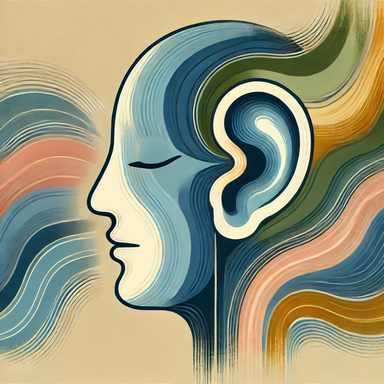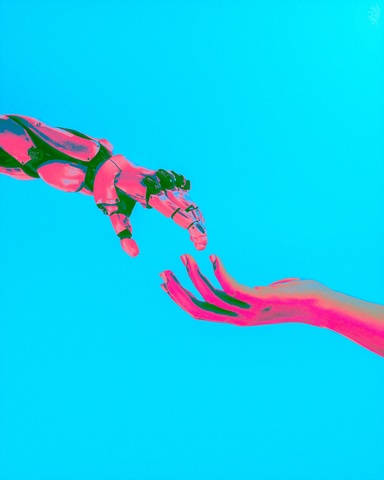May 8, 2025 | Listening

In a world full of noise, we often try to listen—to conversations with colleagues and family, to music in our headphones, to videos blasting from our smartphones. We hear all these things daily, but what does it mean to truly listen? In what sense do our devices also listen to us? What is the role of silence in listening? How has listening changed over time? Can political tensions be eased through listening? How is listening both an art and a science?
This Wide Lens event brought together researchers from science, social sciences, the humanities, and the arts to investigate what it means to listen deeply and thoughtfully.
Presenters:
- Gerta Bardhoshi, Counseling (College of Education) — "Listening and Responding: Equipping Educators to Address Student Mental Health"
- Brittany Bettendorf, Rheumatology (Carver College of Medicine) — "Listening Lessons in the Clinical Encounter"
- Eric Hunter, Communication Sciences and Disorders (CLAS) — "From Silence to Noise: Understanding Their Impact on Oral and Aural Communication"
- Julianna Pacheco, Political Science (CLAS) — "Building Power through Storytelling"
- Damani Phillips, Jazz Studies, School of Music (CLAS) — "Read and Blew Notes: Revolutionizing the Concept of an Album Release"
- Morten Schlütter, Religious Studies (CLAS) — "Listening with Empathy in the Study of Asian Religions"
Hosts: Luis Martín-Estudillo, Director, Obermann Center for Advanced Studies, and Lauren Cox, Assistant Director, Obermann Center for Advanced Studies
April 25, 2024 | Climate

Rising seas, toxic rivers, deforestation, smoke-filled air—headlines remind us daily of the local, national, and international impacts of climate change. World-renowned climate scientist, Jerald Schnoor opened the event with big-picture issues. That set the stage for artist Isabel Barbuzza’s work on South American lithium salt mines, environmental literary scholar Eric Gidal’s work on Iowa’s watersheds, feminist anthropologist Meena Khandelwal’s engagement with Rajasthani villages in India, and natural resource economist Silvia Secchi’s rooting into the farms and rivers that surround us. Together, the presenters offered crucial insights into the challenges we face and hope that if we work together, change is possible.
Presenters:
- Jerald Schnoor (College of Engineering) — "Climate Change—Where We Are Now"
- Silvia Secchi (Geographical and Sustainability Sciences, CLAS) — "Adapting Agriculture, Land, and Water to Climate Change"
- Isabel Barbuzza (Art and Art History, CLAS) — "Visualizing Climate Dangers—The Case of Lithium"
- Meena Khandelwal (Anthropology and Gender, Women’s, and Sexuality Studies, CLAS) — "Cookstoves and Climate Change in India"
- Eric Gidal (English, CLAS) — "Connecting Data and Storytelling in Iowa's Watersheds"
Ruthless Timekeeper — Teresa Mangum, Obermann Center for Advanced Studies, Office of the Vice President for Research
Additional Hosts — Roland Racevskis, Associate Dean for the Arts and Humanities, CLAS; Kristy Nabhan-Warren, Associate Vice President for Research in the Arts, Humanities, and Social Sciences
November 30, 2023 | Artificial Intelligence

In the last week, you’ve probably asked Google to answer questions, chatted with Siri, rocked out to a new band recommended by Spotify, or asked Chat GPT to produce a first draft of a form letter for you—reminders that our lives are already deeply entwined with artificial intelligence. The term "AI" covers a host of technologies. What connects them? Our very human ambition to create machines that can learn to solve problems. For this Wide Lens panel, experts from computer science, engineering, health care, law, language learning, ethics, and the arts shared how they’re engaging with AI, which forms AI takes in their work, and what questions they’re asking about future interactions between humans and machines.
Presenters:
- Jovana Davidovic (Philosophy, CLAS) — "AI and Ethics"
- Mihailis Diamantis (College of Law) — "AI and the Law"
- Daniel Fine (Theatre Arts and Dance, CLAS) — "AI and the Immersive Arts"
- Claire Frances, Giovanni Zimotti, and Luke Whitaker (Center for Language and Culture Learning, CLAS) — "AI and the Learning of Languages"
- Jeydith Gutierrez (Internal Medicine, Carver College of Medicine) and James Blum (Anesthesia and Chief Health Information Officer, Carver College of Medicine and Computer Science, CLAS)— "AI and Medicine"
- Daniel McGehee (Driving Safety Research Institute, College of Engineering) — "AI and the Road"
- Daniel Miller (Sculpture and Intermedia, CLAS) — "AI and the Arts"
- Padmini Srinivasan (Computer Science, CLAS) — "AI and Its Capabilities"
Ruthless Timekeeper — Teresa Mangum, Obermann Center for Advanced Studies, Office of the Vice President for Research
Additional Hosts — Roland Racevskis, Associate Dean for the Arts and Humanities, CLAS; Kristy Nabhan-Warren, Associate Vice President for Research in the Arts, Humanities, and Social Sciences
May 5, 2023 | Memory

What is forgotten? What is remembered? How reliable are our recollections? What ethical questions could or should guide how we engage with others’ memories? For this event, six scholar-artists reflected on memory from the perspective of various disciplines.
Presenters:
- Isabel Muzzio (Psychological and Brain Sciences, CLAS; and Neuroscience Institute, Carver College of Medicine) — "Remembering Our Past: Emotions Matter"
- Marie Kruger (English and GWSS, CLAS) — "Curating Women's Memories of Apartheid"
- Cory Gundlach (Stanley Museum of Art) — "Making Time: A Memory Board from the Congo in Iowa"
- Amber Brian (Spanish & Portuguese, CLAS) — "Memories of the Conquest of Mexico"
- Paula Amad (Cinematic Arts, CLAS) — "The Cloud in the Archive"
- Mercedes Bern-Klug (Social Work, CLAS) — "When Memory Fades: Tap into Imagination"
Moderator — Nandakumar Narayanan, Juanita J. Bartlett Professor in Neurology Research; Associate Professor and Vice Chair for Basic and Translational Research, Neurology; Associate Director, Iowa Neuroscience Institute; Assistant Director, Clinical Neuroscience Training Program; Carver College of Medicine
Ruthless Timekeeper — Teresa Mangum, Obermann Center for Advanced Studies, Office of the Vice President for Research
Additional Hosts — Roland Racevskis, Associate Dean for the Arts and Humanities, CLAS; Kristy Nabhan-Warren, Associate Vice President for Research in the Arts, Humanities, and Social Sciences
December 1, 2022 | Water

In this first of several pecha kucha gatherings, we heard many rapid-fire research stories that looked at water from fascinatingly different angles, then connected with colleagues from across the University over food and drink in the Stanley Museum of Art.
Presenters:
- Jean-François Charles (Music, CLAS) — "Sounding Water"
- Rob Rouphail (History, CLAS) — "The Black Water of the Indian Ocean"
- Samantha Zuhlke (Planning and Public Affairs, Graduate College) — "Citizen-Consumers, Drinking Water, and Public Distrust"
- Terry Conrad (Art and Art History, CLAS) — "Ocean as Printshop"
- Michelle Scherer (Civil & Environmental Engineering, College of Engineering) — "Get the Lead Out of Iowans’ Drinking Water!"
Moderator — David Cwiertny, Civil and Environmental Engineering and Center for Health Effects of Environmental Contamination, College of Engineering and CLAS
Ruthless Timekeeper — Teresa Mangum, Obermann Center for Advanced Studies, Office of the Vice President for Research
Additional Hosts — Roland Racevskis, Associate Dean for the Arts and Humanities, CLAS; Kristy Nabhan-Warren, Associate Vice President for Research in the Arts, Humanities, and Social Sciences